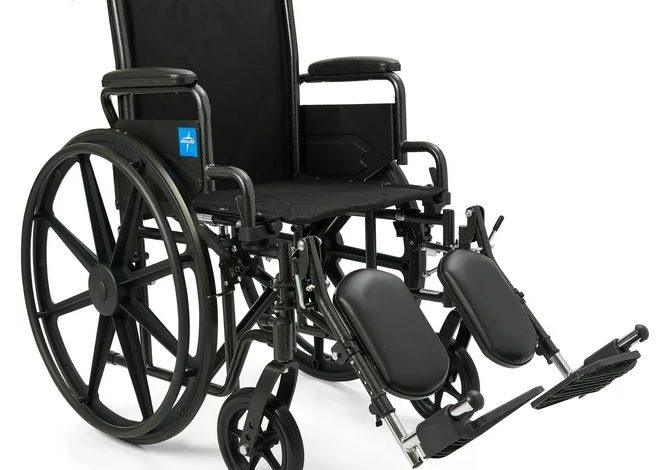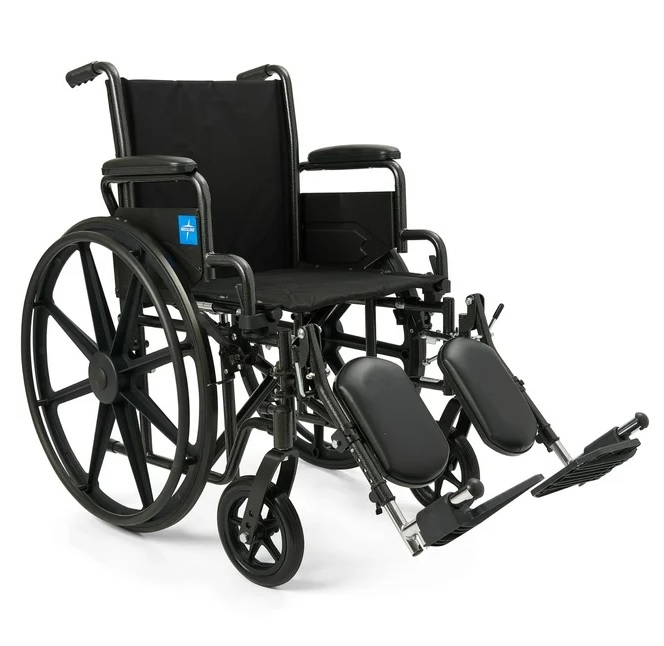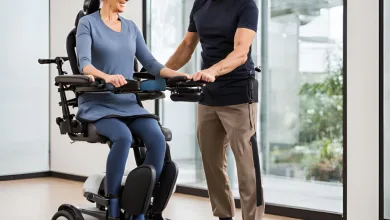Ultimate Guide to Wheelchair for Elderly Comfort (2024)

Table of Contents
Ultimate Guide to Wheelchair for Elderly Comfort
Keeping Seniors Mobile and Comfortable: A Guide to Wheelchairs
Imagine yourself as a grandpa or grandma, zipping around the park with a spring in your step – well, maybe with the help of wheels! Maintaining mobility and independence is crucial for seniors, and a wheelchair for elderly comfort can be a game-changer. This guide dives deep into the world of senior wheelchairs, helping you find the perfect fit for a happy, active life.
Understanding Elderly Needs: Comfort is Key
As we age, our bodies change. Seniors might experience reduced muscle strength, making maneuvering a traditional wheelchair challenging. Additionally, pressure sores can develop from prolonged sitting. Here’s where comfortable wheelchairs for the elderly come in! They prioritize features that address these concerns, promoting:
- Proper posture: An ergonomic backrest supports the spine, preventing slouching and discomfort.
- Reduced pressure: Pressure-relieving cushions minimize the risk of pressure sores.
- Easy transfers: Adjustable features like armrests and footrests assist with getting in and out of the chair.
Remember: Every senior is unique. Consider individual needs and preferences when choosing a wheelchair.
Features for Ultimate Elderly Comfort
Now, let’s explore the features that make a wheelchair most comfortable for elderly individuals:
- Seat & Backrest: Look for adjustable components like seat depth, width, and height for optimal leg positioning. Plush, pressure-relieving cushions and contoured backrests provide exceptional comfort.
- Armrests & Footrests: Adjustable armrests make transferring more accessible, while swing-away or elevating leg rests enhance comfort and circulation.
- Frame & Wheels: A lightweight yet sturdy frame ensures maneuverability. Solid tires are puncture-proof, while pneumatic tires offer a smoother ride.

comfortable wheelchair seat with adjustable features
Tip: Consider add-on features like headrests, lateral support cushions, and lap belts for additional comfort and security.
Exploring Different Wheelchair Types: The Perfect Fit Awaits!
The wheelchair world offers various options to suit specific needs. Let’s delve into some popular choices:
- Best Manual Wheelchair for Elderly: Ideal for active seniors who enjoy pushing themselves, these wheelchairs are lightweight and customizable.
- Lightweight Wheelchairs for the Elderly: These champions of portability are perfect for travel or navigating tight spaces.
- Foldable Wheelchairs for Elderly: Folding neatly for storage and transportation, these wheelchairs are a great choice for seniors on the go.
- The Most Comfortable Wheelchair for All-Day Use: These wheelchairs are built for extended sitting periods and feature all the comfort bells and whistles—think plush cushions and supportive backs.
- Best Wheelchair for Long-Term Use: Durable and built to last, these wheelchairs offer reliable support for daily activities.
It’s essential to consult a healthcare professional to determine the ideal wheelchair type and features for your specific needs.
Here are some specific examples of wheelchairs within each category, along with estimated price ranges to give you a better idea:
1. Best Manual Wheelchair for Elderly (few examples):
- Sunrise Medical Quickie Nitro (estimated price: $2,000 – $3,500) – This lightweight and highly customizable manual wheelchair is known for its maneuverability and performance. It features an adjustable frame, seat, and backrest for a perfect fit and comes in various weight capacity options.
2. Lightweight Wheelchairs for Elderly:
- Drive Medical Scout 18 Self-Propel Wheelchair (estimated price: $200 – $400) – This ultra-lightweight and portable wheelchair folds compactly, making it ideal for travel or storage in tight spaces. It boasts a durable aluminum frame and comes with removable swing-away armrests and footrests for added convenience.
3. Foldable Wheelchairs for Elderly:
- Invacare LiNX 10 Standard Wheelchair (estimated price: $500 – $800) – This user-friendly folding wheelchair folds easily for transportation and storage. It offers a comfortable padded seat and backrest, adjustable armrests, and swing-away leg rests for easy transfers.
4. Most Comfortable Wheelchair for All-Day Use:
- Permobil JAY J3 Bariatric Wheelchair (estimated price: $3,000 – $5,000) – This feature-rich wheelchair prioritizes comfort for extended sitting periods. It boasts a pressure-relieving cushion, a highly adjustable backrest with lumbar support, and optional headrests and leg abduction pads for maximum comfort and support.
5. Best Wheelchair for Long-Term Use:
- Karma SX721 Lightweight Wheelchair (estimated price: $1,000 – $1,500)—This durable and reliable wheelchair is built to last. Its strong steel frame offers excellent weight capacity, and the padded vinyl seat and backrest provide comfort for everyday use. It’s also easily customizable with various add-on options.
Please note: These are just a few examples, and prices can vary depending on the specific features, brand, and retailer. It’s important to consult with a healthcare professional to determine the most suitable wheelchair for your individual needs and budget.
Free Wheelchairs for Elderly: Financial Assistance Options
The cost of a wheelchair can be a concern. Thankfully, various programs might offer free wheelchairs for elderly individuals. Here are some resources to explore:
- Medicaid: This government program may cover the cost of a wheelchair deemed medically necessary.
- Medicare: While Medicare generally doesn’t cover wheelchairs, some supplemental insurance plans might offer coverage.
- Non-profit organizations: Many charitable organizations provide wheelchairs or financial assistance for purchasing one.
Remember: Eligibility requirements and application processes vary. Research local resources for the most up-to-date information.
Making the Right Choice: Try Before You Buy!
Don’t settle for the first wheelchair you see! Here are some tips to ensure you choose the right one:
- Get a professional assessment: A healthcare professional can evaluate your needs and recommend the most suitable wheelchair type and features.
- Take it for a test drive: Try out different wheelchairs to see which one feels most comfortable and offers the best maneuverability.
- Consider factors like weight capacity, foldability, and portability: Choose a chair that fits your lifestyle and needs.
Remember: A comfortable wheelchair can empower seniors to live independently and participate in activities they enjoy.
FAQs: Your Wheelchair Concerns Answered
Q: How much does a wheelchair for the elderly cost?
A: The cost of a wheelchair for elderly can vary greatly depending on the features, brand, and materials. Prices can range from a few hundred dollars for a basic manual wheelchair to several thousand dollars for a high-end, customized power wheelchair.
Q: Are there any insurance plans that cover wheelchairs?
A: Medicare generally doesn’t cover the cost of wheelchairs unless it’s deemed medically necessary as part of a hospital stay. However, some supplemental Medicare insurance plans might offer coverage for wheelchairs. Medicaid, a government program for low-income individuals, may cover the cost of a wheelchair if it’s considered medically necessary.
Q: What are some signs that my elderly loved one might need a wheelchair?
A: Here are some indicators that a wheelchair might benefit your elderly loved one:
- Difficulty walking safely or independently
- Experiencing pain or fatigue while walking
- Increased risk of falls
- Reduced stamina or endurance
- Difficulty keeping up with daily activities
Q: How do I care for a wheelchair for elderly use?
A: Proper maintenance is crucial for ensuring the safety and comfort of your loved one. Here are some essential tips:
- Clean the wheelchair regularly: Use mild soap and water to wipe down the frame, seat, and backrest.
- Inspect the tires: Check for wear and tear and inflate them according to the manufacturer’s recommendations.
- Lubricate moving parts: This helps ensure smooth operation and prevents rust.
- Have the wheelchair serviced regularly: Most manufacturers recommend professional maintenance checks at least once a year.
Q: Where can I find more information about wheelchairs for elderly?
Here are some resources that offer additional information about wheelchairs for elderly individuals:
- The National Institute on Disability, Independent Living, and Rehabilitation Research (NIDILRR): https://www.nidcd.nih.gov/directory/national-institute-disability-and-rehabilitation-research-office-special-education-and
- The American Occupational Therapy Association (AOTA): https://www.aota.org/
- The Medicare website: https://www.medicare.gov/
By considering these FAQs and the information in this guide, you can feel confident choosing the perfect wheelchair for your elderly loved one, promoting their comfort, independence, and overall well-being.
Did this guide make choosing a wheelchair a breeze? Share your wheelchair wins (or funny stories) in the comments section below!



